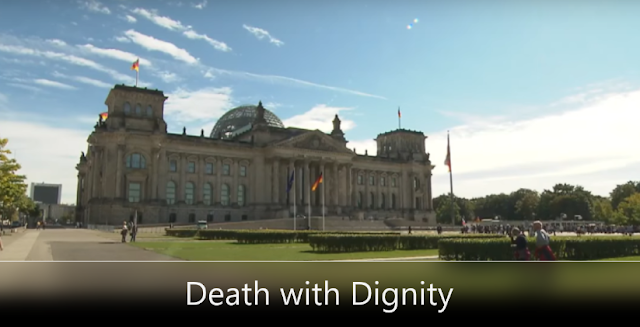What kind of life is dignified? What is dying with dignity?
Finding orientation is a challenge in a world full of different and varying values and cultures.
One possibility might lies in personal and collective reflection about the values that guide us and the different cultures in which we live.
What kind of life is dignified? What is dying with dignity?
But sooner or later a much bigger problem arises: Who judges what is dignified for human?
- Each person for himself?
- A cultural community?
- Ethics experts?
- State institutions?
- Churches or religious community?
Each of the named seems on the one hand to be overwhelmed by answering this - on the other hand, there are institutions that demand general validity.
Not I, nor anyone else can travel that road of life someone else. Everyone must travel and define the road themself. It is not far. It is within reach. If not work on it . because you have been on it since you were born. You should know which places and how you want to visit them - and if the road of life is getting too painful, too ignoble and unbearable everyone should have the right to define the final destination and to ask for help.
Dignity is an immutable and fundamental element of every being.
But what does that mean for dying on one's won will and dying on your own terms?
Is it against the dignity of a person to withhold this from them?
Or is it not more important to emphasize the dignity of sick and frail life - and to forbid assisted suicide?
People should be recognized and respected in their uniqueness and with their needs.
What is important to the unique person, what would they like to experience, eat or drink, which relatives would they like to see again, in what surroundings would they like to die? Last wishes should be fulfilled as far as possible.
'Good' dying means above all dying with dignity. And an important point is of course always freedom from pain and suffering. Nobody wants to torment themselves in the end and nobody really needs to be in pain. Nowadays, in most cases, it is possible that one can die fully conscious and without pain.
How can one prepare to die?
A living will / advance health care directive is an essential part of good preparation and I recommend a personal letter that says what made life so special and makes life worth living for this person who consider to pass away. And furthermore in the personal letter the person should note down what they are not want to go through. Knowing the will of those who are willing to die is ultimately a great help for doctors, employees of care facilities and family, relatives and friends.
What are the criteria for a “good” death for people?
In addition to the aforementioned criteria of autonomy, dignity, uniqueness, freedom from pain and lack of symptoms, the presence of relatives or people close to them often also plays a role. In our case of my wife, it was her mother (my mother-in-law), my wife's best girlfriend, and myself, her husband. In this case it is important that they are simply there, were around her, make the dying person feel like they are not alone, hold their hand, transmit feelings, give warmth and love - and let them go.
I loved you, I love you and will always love and miss you my dear wife.






If you like - Please send me your comment, or suggestion you may have. I will not publish the comments. If you want a reply please don't forget to leave your contact information.
ReplyDelete